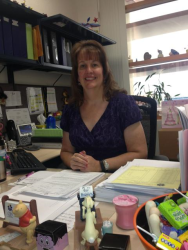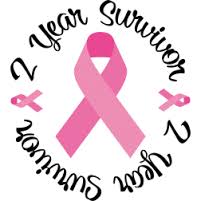By Joaquin Lomeli Jr.
Sonya Newton was about to face the greatest battle of her life when she was diagnosed with breast cancer.
Newton, administrative assistant for human resources at College of Southern Nevada, woke up one morning, took a shower and felt a strange lump on her chest. She had some experience with breast cancer as her mother, a 30-year breast-cancer survivor who recently passed from Dementia, went through it. Right away she contacted her sister-in-law Sarah Newton, a doctor at Red Rock OBGYN.
“I called Sarah immediately and said that I found a lump in my breast this morning, so she ordered tests,” Newton said. “She ordered a mammogram and an ultrasound immediately and that’s when I got diagnosed about two weeks later.”
“I knew it was cancer,” Newton said. “The day of the ultrasound and the mammogram, the look on the technician’s face… I knew it was bad.”
According to the American Cancer Society’s website, breast cancer is a malignant tumor that starts in the cells of the breast that grow into surrounding tissues or spread to distant areas of the body. One in eight women will develop invasive breast cancer during their lifetimes and about 40,000 women will die from breast cancer. The best way to fight against the disease is to detect it early through mammogram testing.
Newton immediately met with an oncologist and breast surgeon. They ordered a series of tests including blood work, bone and PET scans and a radioactive MRI to target the breast tissue. One of the most important tests was having her heart checked to make sure that she was strong enough to withstand the side effects of chemotherapy without having a heart attack.
The cancer was found in Newton’s right breast tissue and spread to three of five lymph nodes that had to be taken out under her right arm where the cancer was targeted in the PET Scan. Newton immediately started chemotherapy because the surgeon wanted to shrink the cancer first before they did any kind of surgery.
“After my first chemo treatment, I was waiting,” Newton said. “Every day I would freak myself out. Is today the day my hair is going to fall out?”
Newton decided to take action and host a head-shaving party. She invited family, friends and co-workers to cut her hair since that was the one thing she could control.
Newton’s brothers shaved their heads too in support of their little sister. Surprisingly, one of her good friends Angela also shaved her hair off. The party was filled with positive energy and was very emotional for those who attended.
Newton never wore wigs especially during those hot summer days because she was not ashamed and had nothing to hide.
On September 2012, she had a double mastectomy to remove both breasts completely along with the cancer. After, she had reconstructive breast surgery.
During these difficult times her friends played a huge role as her support system. One of her big supporters was a woman named Janel, who had breast cancer herself and went through the entire process with Newton. Unfortunately, Janel’s breast cancer was severe and she passed away last year in September.
The death of Janel really hit Newton hard. She began to feel survivor’s guilt.
“It was really hard for me because I asked myself: Why did I live and why did she die?” Newton said. “She had a son who was 8, a husband and parents.”
Devastated by the death of her biggest supporter, Newton had to stay strong and continue to fight her battle.
“Janel’s big philosophy, even though she was dying, was be grateful for today because tomorrow is not promised and I try to live by that,” Newton said. “You always got to be grateful for what you have because someone always has it worse than you.”
Newton had her co-workers at CSN who stepped in and helped her out in any way they could.
“I accompanied her to numerous doctors’ appointments, lab tests, sat with her through her chemotherapy appointments, attended support meetings with her and most importantly provided a positive environment for her,” said Debbie Tanner, friend of Newton and CSN coordinator of equal-opportunity employment. “I did what I had to do for my friend.”
“It is difficult to see your close friend, almost sister, faced with the uncertainty of life and death,” Tanner said. “It was a rude awakening of how very fragile life is and that no one is protected from this devastating disease. All I knew was that I had to do everything I could to help her beat the cancer.”
Faculty from CSN’s science department fundraised to collect money to help Newton pay for her medical bills. They sold car stickers that said “Get well Sonya” with a pink ribbon attached.
“Over at the science department, it is a family,” Newton said. “It was like one of their family members was sick and they had to fix it.”
Newton received a lot of support from her friends and family and for that reason she now volunteers with many programs to give back including Susan G. Komen’s Race for the Cure and American Cancer Society’s Making Strides Against Breast Cancer. She walks in memory of her mother and Janel.
“I admire woman like Sonya and I am grateful that they are willing and able to share their stories,” said Lisa Bakke, senior director of budget service at CSN and co-captain of CSN’s Making Strides team. “They have been through so much and I believe by sharing their stories they are raising awareness by helping others to understand the importance of early detection and creating hope.”
Today, Newton has her blood checked every three months to make sure there are no cancer cells growing. She currently takes hormone-blocking cancer medication every night for five years until the doctors clear her from cancer.
An individual’s weight may contribute to cancer returning. Due to this, Newton chose to have a gastric-sleeve surgery to help reduce her weight from 276 pounds to 155 pounds.
“I am determined to fight cancer,” Newton said. “I do not want it to come back, so I am trying to do everything I can to prevent that from happening.”
Newton has been cancer free for two years. Her determination to never give up helped her overcome this battle. “You just have to be tough and you have to fight,” Newton said. “You have to want to live. I did not want to be a statistic. I wanted to survive and luckily I have.”





